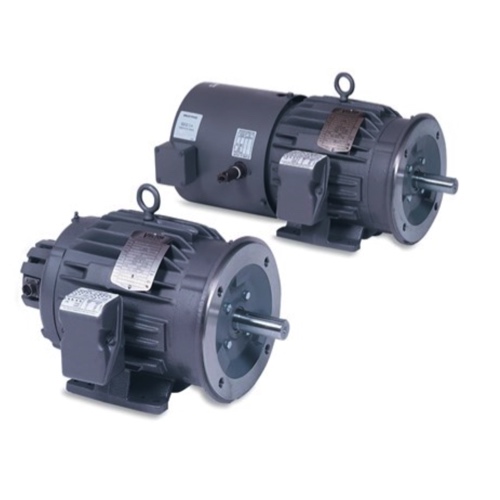Inverter Vector Duty Motors

Inverter vector duty motors are specifically engineered for use with variable frequency drives (VFDs) in adjustable speed industrial applications. As VFD usage continues to increase, standard motors can be exposed to voltage spikes, harmonic distortion, and added thermal stress. Inverter vector duty motors are designed to withstand these conditions while maintaining reliable performance and long service life.
Three phase inverter vector duty motors from manufacturers such as Nidec and Baldor-Reliance are widely used in applications requiring precise speed and torque control, including material handling systems, conveyors, machine tools, pumps, and fans. The “inverter duty” rating indicates the motor’s ability to handle electrical effects produced by VFDs, while the “vector duty” designation reflects enhanced performance under closed-loop or sensorless vector control strategies. When paired with a suitable drive, many models are capable of providing constant torque down to zero speed.
RSP Supply carries a full line of inverter vector duty motors from Nidec and Baldor-Reliance in a wide range of horsepower ratings, enclosure types, and mounting configurations. These motors are built for demanding industrial environments where durability, efficiency, and accurate speed control are critical to system performance.
FAQs
Q: What is an inverter vector duty motor?
An inverter vector duty motor is designed for operation with a variable frequency drive and is built to withstand voltage spikes, harmonics, and thermal stress while delivering precise speed and torque control.
Q: Can totally enclosed fan cooled inverter duty motors provide constant torque at zero speed?
Yes, when used with an appropriate VFD, totally enclosed fan cooled inverter duty motors can provide constant torque at zero speed.
Q: Are inverter duty AC motors suitable for adjustable speed applications?
Yes, inverter duty AC motors are well suited for adjustable speed applications such as material handling, conveyors, and machine tools due to their ability to operate efficiently over a wide speed range.
Q: What is the difference between inverter duty and vector duty?
Inverter duty refers to a motor’s ability to handle the electrical stresses produced by a VFD, while vector duty indicates enhanced performance for precise speed and torque control in vector-controlled applications.
Q: What types of motor control devices are used with inverter duty motors?
Inverter duty motors are commonly paired with variable frequency drives. Depending on the application, motor starters or soft starters may also be used, though they do not provide full speed control like a VFD.
Motor Starters, Soft Starters and VFDs
Why Buy Inverter Vector Duty Motors from RSP Supply
RSP Supply provides a comprehensive selection of three phase inverter vector duty motors for industrial and automation applications. Our product offerings include motors from trusted manufacturers with multiple horsepower, enclosure, and performance options. Customers rely on RSP Supply for accurate technical information, dependable product availability, and motor solutions designed to perform reliably in VFD-driven systems.

